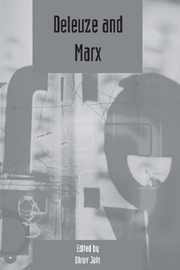Capital, Crisis, Manifestos, and Finally Revolution
from Editor's Introduction
Published online by Cambridge University Press: 12 September 2012
Summary
Gilles Deleuze, in an often-cited interview with Antonio Negri, says that both he and Félix Guattari are Marxists. Deleuze insists: ‘I think Félix Guattari and I have remained Marxists, in our two different ways, perhaps, but both of us’ (Deleuze 1995: 171). However, this spectre of Marx haunting Deleuze's works, both individual and collaborative, has yet to be fully reckoned with, although commentators such as Eugene Holland, Jason Read and Nick Thoburn have all made significant strides in mapping the important contours of this philosophical and political relationship (see Holland 1999; Read 2003; Thoburn 2003). Thus, once again we intervene in the middle, in the middle of a discussion that has already begun and indeed did not simply begin in the heady days of 1968. But the situation in which this intervention is being made could perhaps not have been more timely, as we globally experience the deepest and most crippling economic crisis since the Great Depression. Indeed, Capital is no longer undergoing the simple popping of some temporary economic bubble, as with the dot.com or housing bubbles, or even the credit crunch (even if all these contributed to the current erosion of the economic and social base); rather, it is undergoing a crisis. Yet forces on the ‘Left’ remain unable to provide an appropriate response. Over a century and a half ago, Marx and Engels ended the Communist Manifesto with ‘Workers of the World, Unite!’, and yet we remain as fragmented as before, indeed we remain a ‘sack of potatoes’.
- Type
- Chapter
- Information
- Deleuze and MarxDeleuze Studies 2009 (Supplement), pp. 1 - 7Publisher: Edinburgh University PressPrint publication year: 2010



